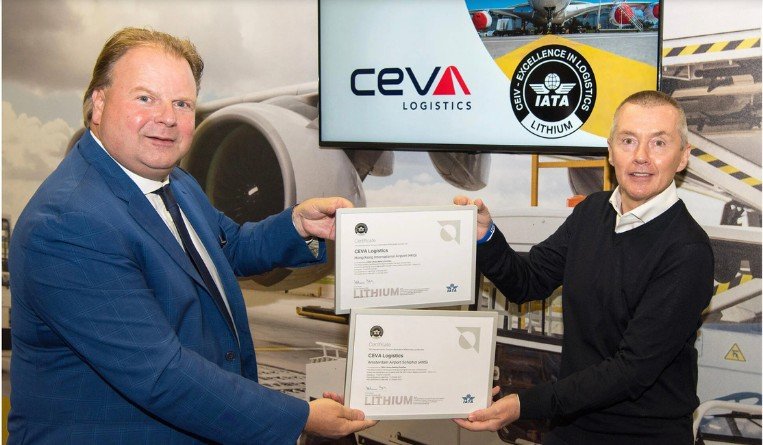Hong Kong and Amsterdam have become the first CEVA Logistics air freight stations to receive IATA’s newCenter of Excellence for Independent Validators (CEIV) Lithium Battery Certification (CEIVLiBa).
The International Air Transport Association launched the new certification to improve the safe handling and transport of lithium batteries across the supply chain – a long-running problem in the air cargo industry.
The certification confirms that Hong Kong International Airport and Amsterdam Airport Schiphol can properly handle and store lithium batteries. The airports accomplished this by creating the necessary training and expertise of on-site employees and was preceded by a period of piloting.
CEVA Logistics plans to extend the initial certifications beyond Amsterdam and Hong Kong, Peter Penseel, CEVA Logistics’ chief operating officer for air freight, said in an interview with Asia Cargo News in the sidelines of IATA’s recent World Cargo Symposium in Dublin.
Hong Kong was chosen because of its importance in the lithium battery trade and its history with the batteries.
“We have to select our key hubs where we consolidate [freight],” said Penseel of CEVA’s plan to take the certification across its network. “Then, a roll-out will follow.” This will see the certification go to all of CEVA’s 17 stations in China as well as throughout its Asian network.
Two staff members each from Amsterdam and Hong Kong were “very well trained” at each site for six weeks and will now be responsible for passing on their knowledge to colleagues. Staff will have procedures written down and have key performance indicators to work to.
“Working safely is the key,” said Penseel, who added that the company is seeking “a mindset change in the sense that we are not only checking on dangerous goods [such as] explosives.”
Lithium batteries have been linked to a number of fires in the recent past, with many in the industry fearing more are to come unless their movement is better regulated. Complicating matters, many such batteries are sent without proper, sometimes illegal, declarations and, in some places, the authorities don’t enforce what rules there are.
The new approach will check that paperwork is done properly, as is the ground handling. This will be supplemented by full scanning of these shipments in an attempt to detect and, “if necessary, opening the boxes,” said Penseel.
The training the company has received will be taken to the industry and beyond in a bid to raise awareness more generally. “We will make sure [we] will inform all the stakeholders, including the governments,” said Penseel.
In particular, this means the regulatory bodies whose help is needed, he added.
Within the industry, the search is also on for extra equipment, an area where the company is working with the ground handlers.
CEVA expects to take on more staff to do the extra work involved, but declined to discuss figures, including how many additional staff members it will need. “Yes, there is more cost involved, but we cannot jeopardize the safety of those in the supply chain,” Penseel said.
As a part of the company’s workload, it looks set to grow. Currently somewhere between 10% and 15% of CEVA’s global volume involves lithium batteries, with new electric vehicles set to increase that by a further 20-25% over the next four years, Penseel told Asia Cargo News.
CEVA is well-positioned for that growth, given its expertise in new electric vehicles (NEV) batteries includes working with 14 of the 15 largest global automotive original equipment manufacturers. It can also support customers through a combination of contract logistics and freight management services in air, ground or ocean transport. “We try to do it cross-modally,” said Penseel.
CEIV Lithium Battery is the fourth CEIV programme from IATA, but CEVA’s first CEIV certification. IATA runs three other specific certifications: CEIV Pharma, CEIV Live Animals and CEIV Fresh. More than 300 companies have received certification under the programmes.
The CEIV LiBa programme recognizes an organization via a certification process. Applicants must successfully pass a CEIV LiBa training, followed by an assessment and validation conducted by an independent validator using criteria outlined in the CEIV LiBa audit checklist.
Training is for personnel involved in the handling and transport of lithium batteries and working for shippers, freight forwarders, airlines and ground handlers. Comprehensive feedback, including a gap analysis and a detailed list of the specific areas of improvement, is provided post-assessment. The validation phase covers the period after the assessment, leading to the granting of the certification for two years.
Michael Mackey



